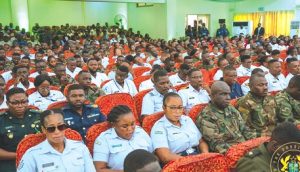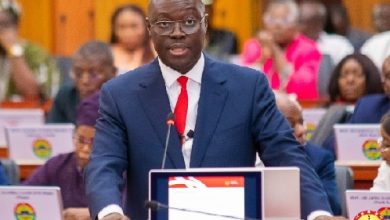President Mahama cautions citizens against online scammers
Celebration of Cyber Security Month: President Mahama cautions citizens against online scammers

President John Dramani Mahama has advised citizens to be wary of the sophisticated activities of online scammers in the country.
He said that cyber fraud, romance scams, hate speech, and insider financial crimes, which were on the rise, would be decisively countered, but said citizens must act as the first line of defence.
“Your bank won’t call you, your telephone provider won’t call you and ask for your personal details. Stay informed and alert on every occasion. If we all can do our duty together, we can build a cyber-resilient country,” the President added.
President Mahama gave the advice at the launch of this year’s National Cyber Security Awareness Month (NACSAM) in Accra yesterday, on the theme: “Building a safe, informed and accountable digital space.”
It highlights both opportunities and risks involved in the nation’s digital transformation.
The event featured a panel discussion of policymakers, industry experts, and civil society actors who deliberated on emerging cyber threats and strategies for strengthening national resilience.
It also included a skit performance on common online scams and demonstrated practical ways citizens could protect themselves in the digital space.
Mr Mahama also inaugurated an 18-member Joint Cybersecurity Committee (JCC) to coordinate national defence against cyber threats.
Activities for the month-long NACSAM celebration include sensitisation of children, the public, businesses, and government agencies to cyber activities, among other programmes.
Cyber incidents
The President said 20 per cent of global cyber incidents targeted finance, causing $12 billion in losses and threatening trust worldwide, according to IMF data.

He outlined four flagship initiatives under the “RESET Ghana Agenda” of the government to safeguard the country’s cyber future.
They are the One Million Coders Programme, the Digital Jobs Initiative, a $50 million fintech growth fund, and a 24-Hour Economy policy anchored on digital resilience.
President Mahama also announced the upcoming ratification of the UN Convention on Cybercrime to strengthen cooperation with global partners in investigating, prosecuting, and extraditing cyber criminals.
“All these efforts – programmes, institutions, treaties- will fail if our people are not informed and vigilant. The truth is simple and straightforward. Our citizens are our first line of defence,” he said.
Building resilience
The Minister of Communication, Digital Technology and Innovations, Samuel Nartey George, underscored the need for a resilient digital ecosystem to safeguard the country’s growing internet and social media space, now serving over 24 million users.
He announced plans for new CERTs in energy, health, academia and transport, alongside the review of the Cybersecurity Act 2020, to address emerging threats.
Mr George also said there were plans to establish a Cybersecurity Fund, a dedicated cybercrime court, and expanded public education.
“Human error is the primary cause of 95 per cent of cybersecurity breaches. That is, unintentional actions and inactions by employees and users can cause, spread or facilitate security breaches.
Police interventions
The Minister for the Interior, Muntaka Mohammed-Mubarak, highlighted five key areas through which the Ghana Police Service had strengthened the fight against cybercrime.
They are crime prevention and digital forensics; intelligence gathering and threat monitoring; capacity-building and specialised training; public awareness and stakeholder engagement, and international and interagency collaboration.
He added that the Cybercrime Unit of the service, in collaboration with international agencies, had successfully arrested 68 suspected cyber criminals, identified 108 victims, and seized over 885 electronic devices linked to illicit activities.
Progress
The acting Director-General of CSA, Divine Selasi Agbeti, said some progress had been made in cybersecurity.
He said the country had been classified as a Tier One role-model status of the ITU Global Cybersecurity Index with a 99.27 per cent score.
Ghana was also the chair of the African Network of Cybersecurity Authorities (ANCA).
He, however, cautioned that inadequate resources, limited working space, and a global shortage of four million cybersecurity experts threaten staff retention.



